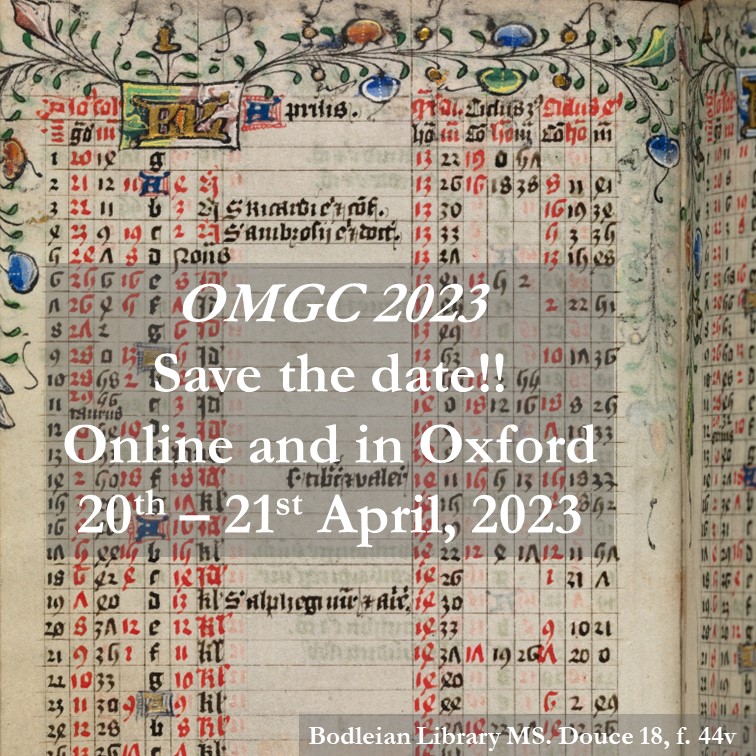1st and 3rd Conference – 25th-27th May 2023 St Cross College and Pusey House, Oxford
25th May Thursday
9h Registration and Coffee
9h30-10h Introduction and Problematique (Maximilian Lau Worcester College, University of Oxford and Gregory Lippiatt University of Exeter)
10h-10h30 Coffee
10h30–11h15 Political argumentation in the 1150s and 1160s: the example of the Saint-Victor Register (Alice Taylor)
11h15–12h The Maliks of Hindustan: A New Conquest Nobility? (Abhishek Kaicker UC Berkeley and
Hasan Siddiqui University of British Columbia)
12h–12h30 Questions and Discussion
12h30–13h30 Lunch
13h30–14h15 Benevolent Elites? Shared Rulership and Privileges in Early Medieval Japan (Mickey Adolphson University of Cambridge)
14h15–15h The Kouroukan Fouga and Oral History: Further Reflections on African Narratives of Noblesse oblige (Adam Simmons Nottingham Trent University)
15h–15h30 Questions and Discussion
15h30–16h Tea
16h Optional Visit to Oriel College Archives (Magna Carta, Papal Bulls and More)
19h Speakers’ Dinner

26th May Friday
9h30–10h Coffee
10h–10h45 Minority Rule in Medieval Syria: The Establishment and Maintenance of the Burids
in Damascus during the Reign of Tughtegin (1104-1128) (Alex Mallett Waseda University, Tokyo)
10h45–11h30 L’aristocratie, l’empereur et le bien commun dans l’empire romain d’Orient (Jean-Claude Cheynet l’Institut universitaire de France)
11h30–12h15 The common good and baronial rebellion in England, c. 1199-1327 (Sophie Ambler University of Lancaster)
12h15–12h45 Questions and Discussion (Alice Taylor King’s College London)
12h45–14h Lunch
12h–12h30 Questions and Discussion
14h–14h45 A Shatterzone on an Ecotone: Fortifying the Steppe-Sown Frontier and Contending for Authority in the Ordos Region of Asia, Circa 800- 1200 (Ruth Mostern University of Pittsburgh)
14h45–15h30 Defining Elite Alterity in the medieval Maghrib and al-Andalus, c. 1000-1300
(Amira Bennison Magdalene College, University of Cambridge)
15h30–16h Questions and Discussion
16h–16h30 Tea
19h Conference Dinner

27th May Saturday
9h30-10h Coffee
10h–10h45 The Limits of Leadership: Cities, Frontiers, and Incursion in the Narratives of North-Western
Europe, 1100–1300 (Emily Winkler St Edmund Hall, University of Oxford)
10h45–11h30 Basqaqs, darughas or envoys? Transience, mobility and Mongol elites in Rus (Angus Russell Trinity College, Cambridge)
11h30–12h15 The Rich, The Poor, and The State: Ideas of Good Government in Song Dynasty China (Sukhee Lee Rutgers University)
Questions and Discussion
12h30–13h30 Concluding Remarks, Round Table Discussion, Next Steps (Gregory Lippiatt University of Exeter and Maximilian Lau Worcester College, University of Oxford)
13h30-14h30 Lunch and Farewell

About the Noblesse Oblige? Project
This project and its conference is a forum for the re-evaluation of ‘baronial’ government and the common good between the tenth and fourteenth centuries across Afro-Eurasian polities. By bringing together emerging and established international scholars, it challenges the traditionally Eurocentric approach to this problem and uses new methodologies to reassess our framework for studying the medieval period, leading to a fundamental reappraisal of the teleological narrative that has previously explained the rise
of modern states.
The story of the medieval barons is commonly a negative one. Because aristocracies have been almost universally eclipsed by centralised states in the modern world, they are often cast as regressive forces whose self-interest held back ‘progress’. Nor is this exclusively a European narrative: the historiographical
attention paid to the ‘rise of the State’ has privileged the Latin Christian experience of political formation and shaped the way in which non-royal élites are seen in other historical contexts. As a result, ‘private’ rulers such as lords, amirs, jun and kshatriya are often assumed to have been at odds with the needs of the wider society.
This network is challenging this understanding of the role of ‘barons’ in their relation to public good in two important and complementary ways. First, we are exploring case studies of how these non-royal élites conceived and implemented responsible government, whether for themselves or for others. Second, we are comparing these case studies in a bold transnational framework, reaching from western Europe to China, that spans the collapse of major centralised imperial projects in the ninth century to the destabilising experience of the Great Death in the fourteenth.

We would like to thank the following organisations for their support of this project and the organisation of this conference:

Supervisory Board
Nandini Chatterjee – University of Exeter
Bernard Gowers – Keble College, University of Oxford
Catherine Holmes – University College, University of Oxford
Yasuhiro Otsuki – Hitotsubashi University, Tokyo
Nicholas Vincent – University of East Anglia
Associate Members
Fernando Arias – University of Valladolid
Susannah Bain – Jesus College, University of Oxford
James Cogbill – Worcester College, University of Oxford
Lars Kjaer – Northeastern University London
Mario Lafuentee – University of Zaragoza
Carlos Laliena – University of Zaragoza













